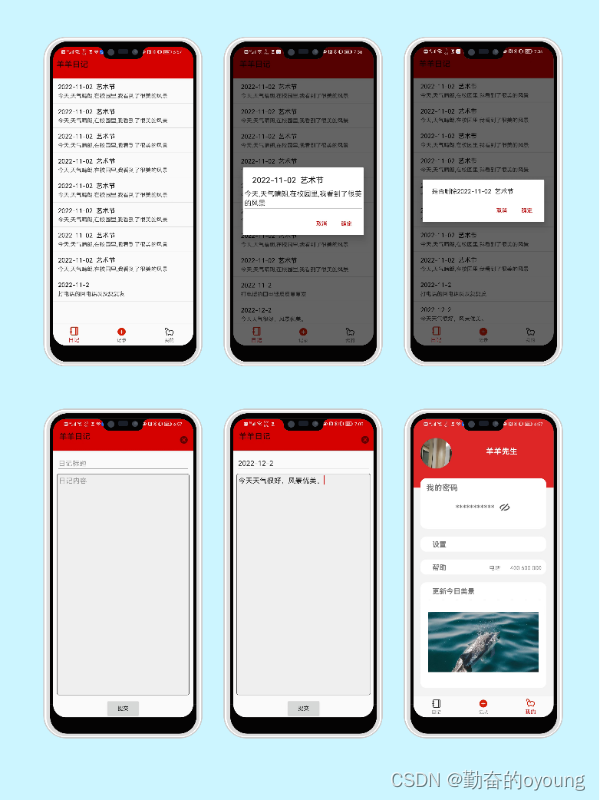Android studio课程设计开发实现—日记APP
文章目录
前言
你们好,我是oy,介绍一个简易日记APP。
一、效果
启动页、引导页及登陆注册

2.日记相关功能

3.个人中心界面

二、功能介绍
1.主要功能
- 实现应用启动页及引导页
- 实现设置密码进入APP,对密码进行加密处理
- 实现底部导航栏,分为日记列表,新建日记,个人中心模块
- 实现对日记删除、修改、新增的基础功能
- 实现圆形头像,通过相册及拍照并裁剪图片设置头像。可实时保存。
- 实现网络更新个人中心美图。
- 对密码展示及关闭,跳转应用设置界面
- 动态获取拍照及相册访问权限
…
…
2.涉及知识点
- activity与fragment数据传递、页面更新、相互跳转。
- SharedPrefrenced存储、文件存储、文件加密。
- Android应用权限获取及设置
- 控件的使用:Button、EditText、AlertDialog、Imageview、ImageButton、viewPager2、Toolbar、RecycleView、NavigationButton等
- 布局的使用:LinearLayout、ConstraintLayout、RelativeLayout等
- 调用Android系统应用
- 自定义View:底部弹窗(比较复杂)、圆形头像
- Glide框架使用:网络加载图片
- Android框架:MVC
…
…
三、实现思路
- MainActivity中使用BottomNavigationView、ViewPager2、Toolbar实现。
public class MainActivity extends AppCompatActivity { private BottomNavigationView bottomNavigationView; @Override protected void onCreate(Bundle savedInstanceState) { super.onCreate(savedInstanceState); setContentView(R.layout.activity_main); initToolbar(); initFragment(); initNavigationBottom(); } @SuppressLint("ResourceAsColor") private void initNavigationBottom() { bottomNavigationView = findViewById(R.id.navigation_bottom); bottomNavigationView.setItemIconTintList(null); bottomNavigationView.setOnNavigationItemSelectedListener(itemSelectedListener); } @Override public boolean onCreateOptionsMenu(Menu menu) { return super.onCreateOptionsMenu(menu); } private void initFragment() { DiariesFragment diariesFragment = getDiariesFragment(); if (diariesFragment == null) { diariesFragment = new DiariesFragment(); ActivityUtils.addFragmentToActivity(getSupportFragmentManager(), diariesFragment, R.id.content); } } private DiariesFragment getDiariesFragment() { return (DiariesFragment) getSupportFragmentManager().findFragmentById(R.id.content); } private void initToolbar() { //设置顶部状态栏为透明 getWindow().addFlags(WindowManager.LayoutParams.FLAG_TRANSLUCENT_STATUS); Toolbar toolbar = findViewById(R.id.toolbar); setSupportActionBar(toolbar); } private final BottomNavigationView.OnNavigationItemSelectedListener itemSelectedListener = item -> { switch (item.getItemId()) { case R.id.menu_diary: MeController.setToolbarVisibility(this); ActivityUtils.removeFragmentTOActivity(getSupportFragmentManager(), getSupportFragmentManager().findFragmentById(R.id.content)); ActivityUtils.addFragmentToActivity(getSupportFragmentManager(), new DiariesFragment(), R.id.content); break; case R.id.menu_me: findViewById(R.id.toolbar).setVisibility(View.GONE); ActivityUtils.removeFragmentTOActivity(getSupportFragmentManager(), getSupportFragmentManager().findFragmentById(R.id.content)); ActivityUtils.addFragmentToActivity(getSupportFragmentManager(), new MeFragment(), R.id.content); break; case R.id.menu_new: bottomNavigationView.setVisibility(View.GONE); MeController.setToolbarVisibility(this); ActivityUtils.removeFragmentTOActivity(getSupportFragmentManager(), getSupportFragmentManager().findFragmentById(R.id.content)); ActivityUtils.addFragmentToActivity(getSupportFragmentManager(), new AddDiaryFragment(), R.id.content); break; } return true; };}MainActivity的layout
<LinearLayout xmlns:android="http://schemas.android.com/apk/res/android" xmlns:app="http://schemas.android.com/apk/res-auto" xmlns:tools="http://schemas.android.com/tools" android:layout_width="match_parent" android:layout_height="match_parent" android:orientation="vertical" tools:context=".MainActivity"> <com.google.android.material.appbar.AppBarLayout android:layout_width="match_parent" android:layout_height="wrap_content"> <androidx.appcompat.widget.Toolbar android:id="@+id/toolbar" android:layout_width="match_parent" android:layout_height="wrap_content" android:background="?attr/colorPrimary" android:minHeight="?attr/actionBarSize" android:fitsSystemWindows="true" android:theme="@style/Widget.AppCompat.Toolbar" app:popupTheme="@style/ThemeOverlay.AppCompat.Light"/> com.google.android.material.appbar.AppBarLayout> <FrameLayout android:id="@+id/content" android:layout_width="match_parent" android:layout_height="0dp" android:layout_weight="1"/> <com.google.android.material.bottomnavigation.BottomNavigationView android:id="@+id/navigation_bottom" android:layout_width="match_parent" android:layout_height="wrap_content" app:menu="@menu/menu_navigation" android:background="?android:attr/windowBackground"/>LinearLayout>- ViewPager2中切换不同fragment,对应导航栏新增日记、个人中心及日记列表。
public class DiariesFragment extends Fragment { private DiariesController mController; @Override public void onCreate(@Nullable Bundle savedInstanceState) { super.onCreate(savedInstanceState); mController = new DiariesController(this); } @Nullable @Override public View onCreateView(@NonNull LayoutInflater inflater, @Nullable ViewGroup container, @Nullable Bundle savedInstanceState) { View root = inflater.inflate(R.layout.fragment_diaries, container, false); mController.setDiariesList(root.findViewById(R.id.diaries_list)); return root; } @Override public void onResume() { super.onResume(); mController.loadDiaries(); }}DiariesFragment的layout
<RelativeLayout xmlns:android="http://schemas.android.com/apk/res/android" android:layout_width="match_parent" android:layout_height="match_parent" android:orientation="vertical"> <androidx.recyclerview.widget.RecyclerView android:id="@+id/diaries_list" android:layout_width="match_parent" android:layout_height="wrap_content"/>RelativeLayout>public class AddDiaryFragment extends Fragment implements View.OnClickListener { private AddDiaryController mController; private View edit_layout; private Button btn_confirm; private EditText edit_title; private EditText edit_desc; @Override public void onCreate(@Nullable Bundle savedInstanceState) { super.onCreate(savedInstanceState); mController = new AddDiaryController(this); } private void initView(View view) { btn_confirm = view.findViewById(R.id.add_diary_confirm); btn_confirm.setOnClickListener(this); edit_title = view.findViewById(R.id.edit_add_title); edit_desc = view.findViewById(R.id.edit_add_desc); edit_layout = view.findViewById(R.id.edit_layout); edit_layout.setOnClickListener(this); } @Override public void onCreateOptionsMenu(@NonNull Menu menu, @NonNull MenuInflater inflater) { inflater.inflate(R.menu.menu_cancel, menu); } @Override public boolean onOptionsItemSelected(@NonNull MenuItem item) { switch (item.getItemId()) { case R.id.menu_cancel: mController.closeWriteDiary(getActivity().getSupportFragmentManager(), this); mController.setNavigationVisibility(); return true; } return false; } @Nullable @Override public View onCreateView(@NonNull LayoutInflater inflater, @Nullable ViewGroup container, @Nullable Bundle savedInstanceState) { View root = inflater.inflate(R.layout.fragment_add_diary, container, false); initView(root); return root; } @Override public void onDestroy() { super.onDestroy(); } @Override public void onClick(View view) { switch (view.getId()) { case R.id.add_diary_confirm: mController.addDiaryToRepository(edit_title.getText().toString().trim(), edit_desc.getText().toString().trim()); mController.setNavigationVisibility(); mController.closeWriteDiary(getActivity().getSupportFragmentManager(), this); break; case R.id.edit_layout: mController.changeFocus(edit_desc); break; } }}AddDiaryFragment的layout
<LinearLayout xmlns:android="http://schemas.android.com/apk/res/android" android:layout_width="match_parent" android:layout_height="match_parent" android:orientation="vertical"> <LinearLayout android:layout_width="match_parent" android:layout_height="wrap_content" android:layout_marginTop="10dp" android:layout_marginStart="10dp" android:layout_marginEnd="10dp" android:orientation="vertical"> <EditText android:id="@+id/edit_add_title" android:hint="@string/add_title_hint" android:minLines="1" android:layout_width="match_parent" android:layout_height="wrap_content" /> LinearLayout> <LinearLayout android:id="@+id/edit_layout" android:layout_width="match_parent" android:layout_height="0dp" android:layout_weight="1" android:layout_marginTop="5dp" android:layout_marginStart="10dp" android:layout_marginEnd="10dp" android:layout_marginBottom="10dp"> <LinearLayout android:layout_width="match_parent" android:layout_height="match_parent" android:paddingStart="5dp" android:paddingTop="5dp" android:paddingEnd="5dp" android:paddingBottom="5dp" android:background="@drawable/edit_background"> <EditText android:id="@+id/edit_add_desc" android:hint="@string/add_title_description" android:gravity="top" android:layout_width="match_parent" android:layout_height="wrap_content" android:scrollbars="vertical" android:background="@null"/> LinearLayout> LinearLayout> <LinearLayout android:layout_width="match_parent" android:layout_height="wrap_content" android:gravity="center" android:orientation="horizontal"> <Button android:id="@+id/add_diary_confirm" android:text="@string/btn_ok" android:layout_width="wrap_content" android:layout_height="wrap_content"/> LinearLayout>LinearLayout>- 将应用密码加密保存与文件中。每次登陆获取密码并对比。
public class LoginDirectActivity extends AppCompatActivity implements View.OnClickListener { private EditText edit_input_text; private Button btn_comeIn; private TextView tv_setPsw; private static final String TAG = "Login2Activity"; @Override protected void onCreate(Bundle savedInstanceState) { super.onCreate(savedInstanceState); setContentView(R.layout.activity_direct_login); bindView(); } private void bindView() { getWindow().addFlags(WindowManager.LayoutParams.FLAG_TRANSLUCENT_STATUS); edit_input_text = findViewById(R.id.edit_login2_input_text); btn_comeIn = findViewById(R.id.btn_login2_comeIn); btn_comeIn.setOnClickListener(this); tv_setPsw = findViewById(R.id.tv_setPsw); tv_setPsw.setOnClickListener(this); } @Override public void onClick(View v) { switch (v.getId()) { case R.id.tv_setPsw: Intent setPsw_intent = new Intent(LoginDirectActivity.this, LoginActivity.class); startActivity(setPsw_intent); LoginDirectActivity.this.finish();// overridePendingTransition(R.anim.out_to_left,R.anim.in_from_right); break; case R.id.btn_login2_comeIn: String psw = edit_input_text.getText().toString().trim(); if (psw.isEmpty()) { Toast.makeText(this, "密码不能为空!", Toast.LENGTH_SHORT).show(); return; } String readInfoByContext = FileUtils.readInfoByContext(this); if (psw.equals(readInfoByContext)) { Toast.makeText(this, "登录成功!", Toast.LENGTH_SHORT).show(); Intent intent = new Intent(this, MainActivity.class); startActivity(intent);// overridePendingTransition(R.anim.out_to_left,R.anim.in_from_right); } else { Toast.makeText(this, "密码不正确!", Toast.LENGTH_SHORT).show(); } break; } }}LoginDirectActivity 的layout
<androidx.constraintlayout.widget.ConstraintLayout xmlns:android="http://schemas.android.com/apk/res/android" xmlns:app="http://schemas.android.com/apk/res-auto" xmlns:tools="http://schemas.android.com/tools" android:layout_width="match_parent" android:layout_height="match_parent" tools:context=".view.LoginDirectActivity"> <Button android:id="@+id/btn_login2_comeIn" android:layout_width="match_parent" android:layout_height="wrap_content" android:layout_marginStart="40dp" android:layout_marginEnd="40dp" android:text="进入" app:layout_constraintBottom_toTopOf="@+id/guideline5" app:layout_constraintEnd_toEndOf="parent" app:layout_constraintStart_toStartOf="parent" /> <LinearLayout android:id="@+id/linearLayout" android:layout_width="match_parent" android:layout_height="wrap_content" android:layout_marginStart="40dp" android:layout_marginEnd="40dp" android:gravity="center_vertical" android:orientation="horizontal" app:layout_constraintEnd_toEndOf="parent" app:layout_constraintStart_toStartOf="parent" app:layout_constraintTop_toTopOf="@+id/guideline7"> <ImageView android:layout_width="32dp" android:layout_height="32dp" android:src="@mipmap/come_in_key" /> <EditText android:id="@+id/edit_login2_input_text" android:hint="输入您的密码" android:inputType="textPassword" android:layout_width="match_parent" android:layout_height="wrap_content" /> LinearLayout> <androidx.constraintlayout.widget.Guideline android:id="@+id/guideline4" android:layout_width="wrap_content" android:layout_height="wrap_content" android:orientation="horizontal" app:layout_constraintGuide_percent="0.22" /> <androidx.constraintlayout.widget.Guideline android:id="@+id/guideline5" android:layout_width="wrap_content" android:layout_height="wrap_content" android:orientation="horizontal" app:layout_constraintGuide_percent="0.58" /> <TextView android:id="@+id/tv_login2_password_title" android:layout_width="match_parent" android:layout_height="wrap_content" android:gravity="center" android:text="输入密码" android:textSize="30sp" android:textStyle="bold" app:layout_constraintEnd_toEndOf="parent" app:layout_constraintStart_toStartOf="parent" app:layout_constraintTop_toTopOf="@+id/guideline4" /> <androidx.constraintlayout.widget.Guideline android:id="@+id/guideline7" android:layout_width="wrap_content" android:layout_height="wrap_content" android:orientation="horizontal" app:layout_constraintGuide_percent="0.4" /> <TextView android:id="@+id/tv_setPsw" android:layout_width="wrap_content" android:layout_height="wrap_content" android:text="设置密码" android:textStyle="bold" app:layout_constraintEnd_toEndOf="@+id/linearLayout" app:layout_constraintTop_toBottomOf="@+id/linearLayout" />androidx.constraintlayout.widget.ConstraintLayout>- 使用SharedPrefrenced存储日记内容及标题。
public final class SharedPreferencesUtils { private static final SimpleArrayMap<String, SharedPreferencesUtils> mCaches = new SimpleArrayMap<>(); private SharedPreferences mSharedPreferences; private SharedPreferencesUtils(final String spName, final int mode) { mSharedPreferences = YyApplication.get().getSharedPreferences(spName, mode); } public static SharedPreferencesUtils getInstance(String spName) { SharedPreferencesUtils utils = mCaches.get(spName); if (utils == null) { utils = new SharedPreferencesUtils(spName, Context.MODE_PRIVATE); } return utils; } public void put(final String key, final String value) { mSharedPreferences.edit().putString(key, value).apply(); } public String get(final String key) { return mSharedPreferences.getString(key, ""); } public void remove(final String key) { mSharedPreferences.edit().remove(key).apply(); }}总结
以上就是今天讲的内容,本文仅仅简单介绍了Android日记APP,需要掌握上述知识点,能够较好的理解此应用逻辑。
来源地址:https://blog.csdn.net/m0_49534667/article/details/128087389





